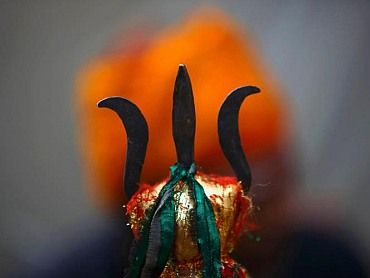After Narendra Modi's exit from state politics, the BJP and Hindutva forces are falling back on communal politics, says Vinay Umarji Navratri, the nine-night garba festival, began in Gujarat on September 25. Communal riots between the Hindu and Muslim communities in the walled city area of Vadodara also started on the same day.
Navratri, the nine-night garba festival, began in Gujarat on September 25. Communal riots between the Hindu and Muslim communities in the walled city area of Vadodara also started on the same day.
According to the police, the trigger this time was a Facebook post, which showed an image of a Hindu goddess with an Islamic religious symbol.
Tension had been mounting for some time.
Earlier, the Vishva Hindu Parishad had distributed pamphlets mentioning the threat posed by the so-called 'love jihad' and asking Hindu parents to keep a close watch on their daughters, as "well-dressed Muslims boys" were out to lure their gullible daughters.
Besides, in several places, Muslims were prevented from attending Navratri festivities.
"Not that this is something new for us, but this time, it somehow escalated quickly. Small riots occur almost every year since the city is quite polarised, as compared to other Gujarat cities. The latest riots brought back memories of 2002," said Kanubhai, a SSG hospital employee, who stays in the Fatehpura area of Vadodara.
Prime Minister Narendra Modi had won the Vadodara seat in the general elections. However, he vacated the seat and opted to represent Varanasi in Parliament.
Before the police and paramilitary forces could respond, it became full-blown communal violence, with several incidents of stabbing, loot and arson reported from various parts of the city.
While over 150 people, including Sunil Rajput who circulated the controversial image, have been arrested, the city is still on the edge.
The city police have been under fire for their slow response. Many say the police took the incident of the morphed image lightly. The situation got so out of control that DGP P C Thakur had to hold a meeting of senior police officials at 2 a m on Monday before calm could be restored. The police, however, say they did their best.
"We immediately arrested troublemakers and lodged cases under Section 153A, and 295A along with the IT Act. Patrolling was strengthened. The locals are feeling secure due to the police presence," A F Sindhi, ACP - 'C' Division of the Vadodara police, told Business Standard.
Activists and non-government organisations have been crying foul over the manner in which the police broke into minority households and attacked youth and women alike in the name of combing operations.
However, the clashes have raised a question: Is Gujarat heading back to the pre-2002 era?
After the violence, the state government extended the controversial Disturbed Areas Act till 2019, which had lapsed on September 30. The Act prohibits the sale of real estate properties between different communities in areas declared as "disturbed".
Vinod Rao, district collector of Vadodara, however, states that the extension of the Act and the communal clashes were purely coincidental.
"The Act was last extended in 2009 and it lapsed on September 30. To renew the Act for another five years, a proposal was made two months ago by me to the government. That got approved two to three days back but not because of the riots," says Rao.
"It is only a coincidence that a law-and-order issue happened a few days before it (the Act) lapsed. It has nothing to do with the extension. The Act is meant to protect the interests of the minorities of any locality by ensuring that nobody is bulldozed into selling the property at a throwaway price. It is not a prohibitive legislation but a protective legislation," says Rao.
Human rights activist Trupti Shah suggested that after the general elections, it was becoming difficult for the ruling party to carry the baton handed over by Modi purely on the development front.
"The government and politicians allowed it (the riots) to happen. Of course, they didn't want it to go out of control. They created hype over development but were not able to deliver. That is why they felt they might lose in the by-elections," says Shah.
Shah called upon secular forces to mount a united fight against communal forces. "If genuine secular forces and ordinary citizens are able to do some serious work to quell this communalisation, then we might not go back to pre-2002 levels," adds Shah.













 © 2025
© 2025